人教版新高考英语二轮复习课件 谓语动词(动词的时态、语态、主谓一致、情态动词和虚拟语气)(42张ppt)
文档属性
| 名称 | 人教版新高考英语二轮复习课件 谓语动词(动词的时态、语态、主谓一致、情态动词和虚拟语气)(42张ppt) |  | |
| 格式 | pptx | ||
| 文件大小 | 1.9MB | ||
| 资源类型 | 教案 | ||
| 版本资源 | 人教版(2019) | ||
| 科目 | 英语 | ||
| 更新时间 | 2022-02-20 22:45:44 | ||
图片预览



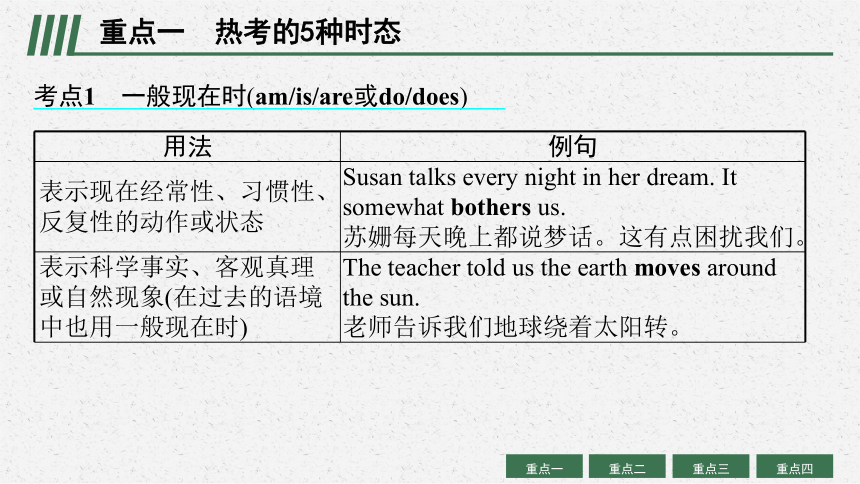
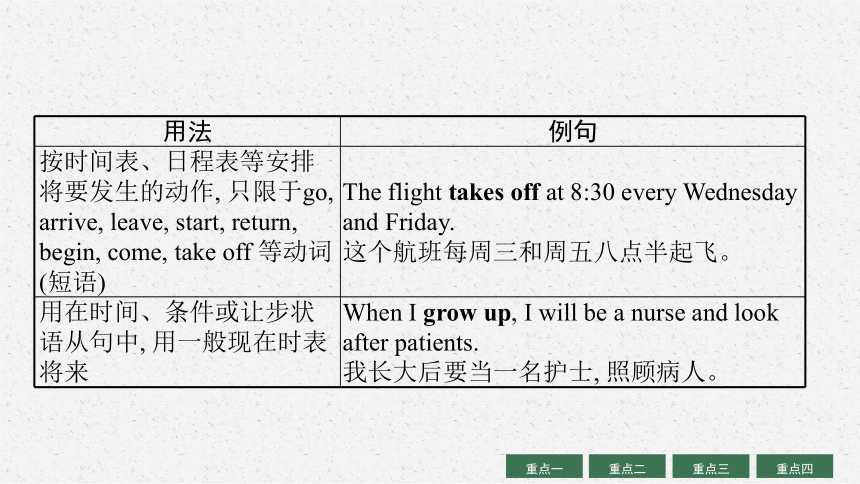
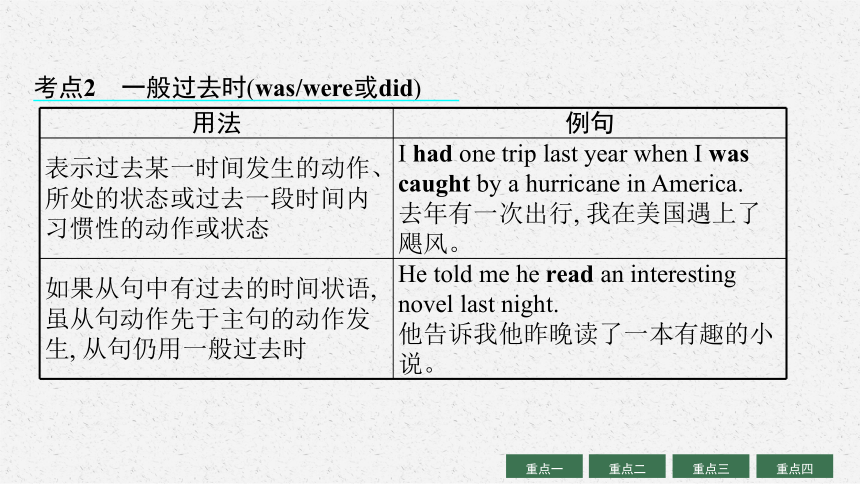

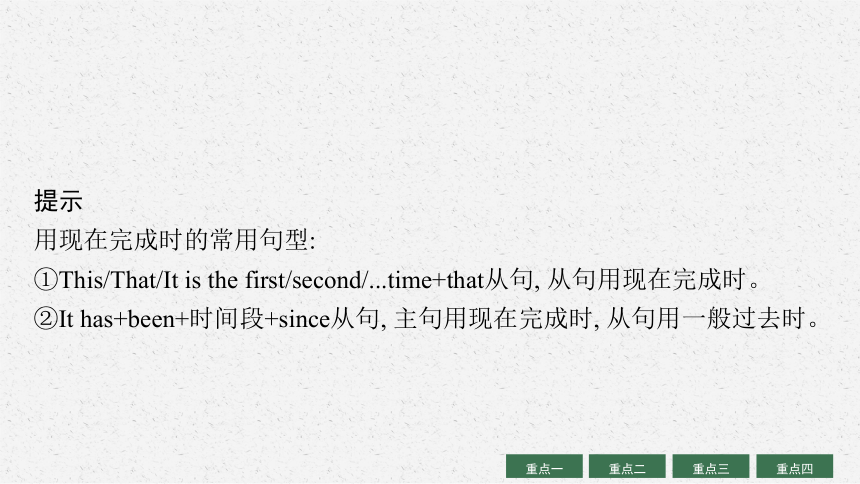

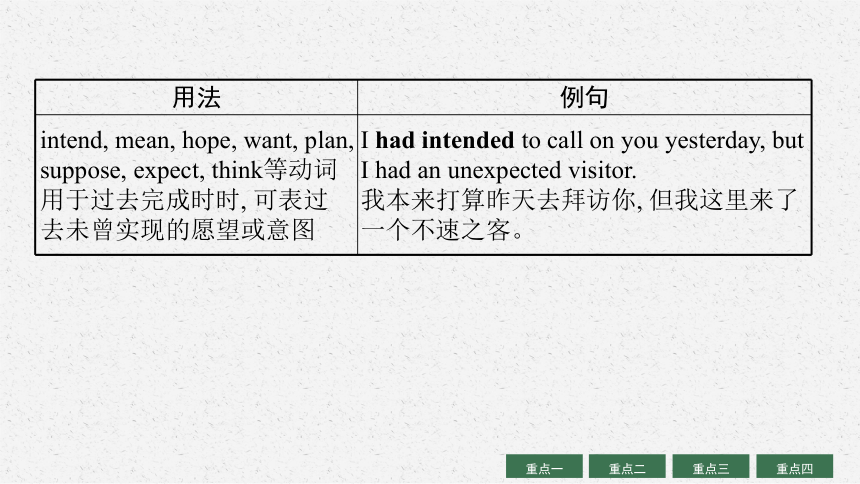
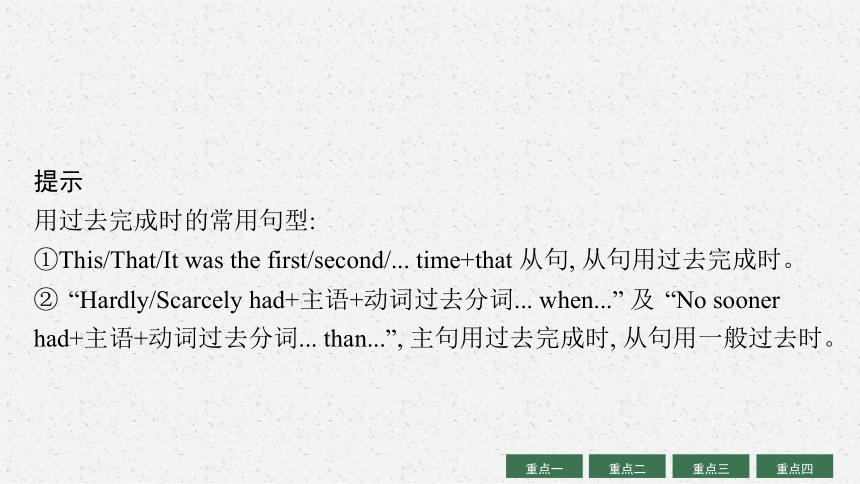
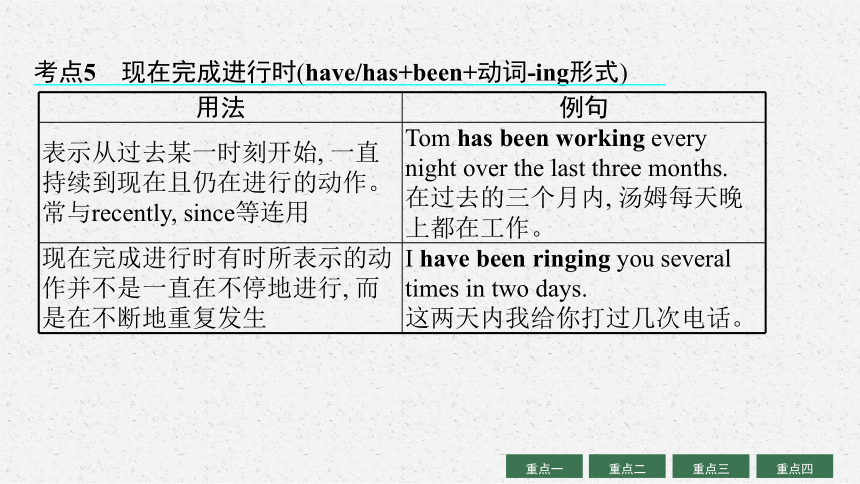
文档简介
(共42张PPT)
核心语法
必备
专题一 谓语动词(动词的时态、语态、
主谓一致、情态动词和虚拟语气)
英 语
2022
高中总复习优化设计
GAO ZHONG ZONG FU XI YOU HUA SHE JI
内容索引
要点精讲 破疑解难
对点演练 精准提升
要点精讲 破疑解难
重点一 热考的5种时态
考点1 一般现在时(am/is/are或do/does)
用法 例句
表示现在经常性、习惯性、反复性的动作或状态 Susan talks every night in her dream. It somewhat bothers us.
苏姗每天晚上都说梦话。这有点困扰我们。
表示科学事实、客观真理或自然现象(在过去的语境中也用一般现在时) The teacher told us the earth moves around the sun.
老师告诉我们地球绕着太阳转。
用法 例句
按时间表、日程表等安排将要发生的动作, 只限于go, arrive, leave, start, return, begin, come, take off 等动词(短语) The flight takes off at 8:30 every Wednesday and Friday.
这个航班每周三和周五八点半起飞。
用在时间、条件或让步状语从句中, 用一般现在时表将来 When I grow up, I will be a nurse and look after patients.
我长大后要当一名护士, 照顾病人。
考点2 一般过去时(was/were或did)
用法 例句
表示过去某一时间发生的动作、所处的状态或过去一段时间内习惯性的动作或状态 I had one trip last year when I was caught by a hurricane in America.
去年有一次出行, 我在美国遇上了飓风。
如果从句中有过去的时间状语, 虽从句动作先于主句的动作发生, 从句仍用一般过去时 He told me he read an interesting novel last night.
他告诉我他昨晚读了一本有趣的小说。
考点3 现在完成时(have/has+动词过去分词)
用法 例句
表示过去发生或已经完成的动作对现在造成的影响或结果, 常与already, yet, ever, never, in the past +时间段等连用 In the last few years, thousands of films have been produced throughout the world.
在过去的几年里, 全世界拍摄了数千部电影。
表示从过去开始一直持续到现在的动作或状态, 可能还会继续下去。往往和表示一段时间的时间状语连用, 如: for+时间段; since+过去时间点/从句 His first novel has received good reviews since it came out last month.
他的第一部小说自上个月出版以来就受到了好评。
提示
用现在完成时的常用句型:
①This/That/It is the first/second/...time+that从句, 从句用现在完成时。
②It has+been+时间段+since从句, 主句用现在完成时, 从句用一般过去时。
考点4 过去完成时(had+动词过去分词)
用法 例句
表示在过去某一时间或过去某一动作之前已经发生并完成的动作, 即“过去的过去” The film had begun when we got to the cinema yesterday.
昨天我们到达电影院时, 电影已经开始了。
表示一个动作或状态从过去某一时间之前已经开始, 一直持续到过去这一时刻的动作 By the time Jack returned home from England, his son had graduated from college.
杰克从英国回到家中时, 他的儿子已经大学毕业。
用法 例句
intend, mean, hope, want, plan, suppose, expect, think等动词用于过去完成时时, 可表过去未曾实现的愿望或意图 I had intended to call on you yesterday, but I had an unexpected visitor.
我本来打算昨天去拜访你, 但我这里来了一个不速之客。
提示
用过去完成时的常用句型:
①This/That/It was the first/second/... time+that 从句, 从句用过去完成时。
② “Hardly/Scarcely had+主语+动词过去分词... when...” 及 “No sooner had+主语+动词过去分词... than...”, 主句用过去完成时, 从句用一般过去时。
考点5 现在完成进行时(have/has+been+动词-ing形式)
用法 例句
表示从过去某一时刻开始, 一直持续到现在且仍在进行的动作。常与recently, since等连用 Tom has been working every night over the last three months.
在过去的三个月内, 汤姆每天晚上都在工作。
现在完成进行时有时所表示的动作并不是一直在不停地进行, 而是在不断地重复发生 I have been ringing you several times in two days.
这两天内我给你打过几次电话。
重点二 动词的语态
1.被动语态的构成
现在 过去 将来 过去将来
一般 is/am/ are+动词过去分词 was/were+动词过去分词 will/shall+be+动词过去分词 would+be+动词过去分词
进行 is/am/ are+being+动词过去分词 was/were+being+动词过去分词 — —
完成 have/has+been+动词过去分词 had+been+动词过去分词 will/shall have+been+动词过去分词 would have+been+动词过去分词
2.主动形式表示被动意义
用法 例句
系动词smell, taste, feel, look, sound, prove等后接形容词做表语 Her voice sounds beautiful.
她的嗓音听起来很美妙。
表示主语的某种属性特征或功能的动词, 如read, write, sell, wash, clean, cook, draw等, 常与well, easily, smoothly等副词连用 The shirt doesn’t wash well.
这件衬衫不好洗。
open, close, lock, move, keep等动词常与won’t, can’t, wouldn’t 连用 The drawer won’t lock.
这个抽屉锁不上。
重点三 主谓一致3原则
原则 主语 谓语
语法 一致 原则 单数 单数
复数 复数
就近 一致 原则 由or, either... or..., neither... nor..., not only... but (also)..., not... but...等连接 与最近的主语在单复数上保持一致
原则 主语 谓语
意义 一致 原则 由and连接的两个并列成分表示的是同一概念 单数
no/each/every/many a+单数名词+and (+no/each/every/many a)+单数名词 one/every one/each/either/the number/the variety of+复数名词 clothing, furniture, traffic, jewellery, baggage, equipment等无生命的不可数名词 以-s结尾的表示学科、国家、机构、书籍、报刊等名称的词 时间、重量、距离、价格、金钱、体积等复数名词表示一个整体概念 由every-, any-, some-, no-和-one, -thing, -body等构成的不定代词 单个的动词-ing形式、动词不定式或主语从句 原则 主语 谓语
意义 一致 原则 由and连接的两个并列成分表示两个不同的概念 复数
有生命的集体名词, 如people, police, cattle等 一些常用作复数或只有复数形式的名词, 如goods, stairs, arms等 山脉、群岛、瀑布等以-s结尾的专有名词 集体名词class, family, army, team, club, company, population, enemy, party, crew, audience, committee, government, majority, group等强调整体时谓语动词用单数, 指个体成员时谓语动词用复数 单复数视情况而定
单复数同形的名词, 如means, deer, fish, sheep等 all, none, some, any等不定代词 “half/most/part/the rest/the last/lots/plenty/分数/百分数+of+名词” 做主语, 谓语要和of之后的名词单复数保持一致 提示
①主语后接介词短语或其他插入语, 如with, together with, as well as, along with, besides, like, but, except, including, rather than等, 谓语动词的人称和数与主语的人称和数保持一致。
The leader and artist as well as some of our English teachers was given a chance to go abroad last year.
那位领导兼艺术家和我们的一些英语老师去年得到了一次出国的机会。
②many a, more than one后加可数名词的单数形式, 谓语动词用单数。
More than one student gets involved in the activity.
不止一个学生参加了这个活动。
③a quantity of后既可接不可数名词, 也可接可数名词复数, 谓语动词的单复数根据名词的单复数来决定。quantities of后无论是接复数名词还是不可数名词, 谓语动词均用复数形式。
A quantity of time has been wasted on the project.
=Quantities of time have been wasted on the project.
大量的时间被浪费在这个项目上。
④ “a number of+复数名词” 做主语时, 谓语动词用复数形式, 意为 “许多”;“the number of+复数名词” 做主语时, 谓语动词用单数形式, 意为 “……的数量”。
重点四 情态动词和虚拟语气
考点1 情态动词
1.must/have to
(1)must表示主观上 “必须, 一定要”; have to强调来自 “外界” 的义务, 即表示 “不得不”。
(2)mustn’t用来表示禁止, don’t have to表示没有义务、没有必要做。
2.used to/be used to
(1)used to表示 “过去常常”, 没有人称和数的变化, 可以与过去的时间状语连用, 其否定形式为usedn’t to 或 didn’t use to, 其一般疑问句形式将used 提到主语前或用Did...use to...形式。
(2)be used to多用来表示 “习惯于”, to是介词, 其后接名词、代词或动词-ing形式。
3.情态动词+be+doing
表示对现在和将来正在进行的行为进行推测, 意为“或许正在, 应当正在, 想必正在, 准是正在”。
4.情态动词+have+动词过去分词
情态动词+have+动词过去分词 含义和用法
must have+动词过去分词 过去一定做过……(肯定句)
can/could (not) have+动词过去分词 过去可能做过……(肯定句)
过去不可能做过……(否定句)
could have+动词过去分词 本来能够做但却未做(肯定句)
may/might (not) have+动词过去分词 过去可能做过……(肯定句)
过去可能没有做过……(否定句)
should/ought (not) to have+动词过去分词 本来应该做但是实际上未做……(肯定句)
本来不应该做而实际上做了……(否定句)
needn’t have+动词过去分词 没必要做而做了……
We could have faced the difficulty together, but why didn’t you tell me
我们本来可以一起面对困难, 但是你为什么不告诉我
Mark needn’t have hurried. After driving at top speed, he arrived half an hour early.
马克本不必着急。他开快车后, 早到了半小时。
5.情态动词的特殊句式
(1)cannot help but do表示 “不得不” 之意。
(2)can’t help doing sth表示 “禁不住做某事”。
(3)can’t help (to) do表示 “不能帮忙做某事”。
(4)cannot/never...too...表示 “无论怎样……都不过分, 越……越好”。
(5)may/might as well表示有礼貌的劝告, 意为 “还是……的好, 不妨……”。
(6)if you must...表示不想让某人做某事但也没办法, 意为 “非要, 一定要……”。
考点2 虚拟语气
1.虚拟语气在非真实条件句中的应用
条件 从句谓语 主句谓语 例句
与现在事实相反 过去式(be动词用were) would/should/could/might+动词原形 If I were you, I would seize the chance.
如果我是你, 我就会抓住这个机会。
与过去事实相反 had+动词过去分词 would/should/could/might+have+动词过去分词 If you had taken my advice, you wouldn’t have failed.
如果你听了我的建议, 你就不会失败。
条件 从句谓语 主句谓语 例句
与将来事实相反 ①过去式 ②should+动词原形 ③were to+动词原形 would/should/could/might+动词原形 If he shouldn’t come tomorrow, we would put off the meeting.
如果他明天不来, 我们就推迟这个会议。
2.虚拟条件句的特殊用法
(1)如果条件句谓语含有were, had, should, 可以将if省略, 再把were, should, had移到主语之前; 如果从句中没有were, should或had, 则不能省略if。
(2)but for(要不是), without(要是没有)表示条件, 谓语动词要用虚拟语气。
3.虚拟语气在从句中的应用
(1)虚拟语气用在wish, if only, as if/though后的从句中
条件 从句谓语 例句
从句谓语动作与主句谓语动作同时发生 过去式(be动词用were) How I wish I were a flying bird!
我多希望我是一只会飞的鸟儿啊!
He looks as if he were an artist.
他看上去好像是名艺术家。
条件 从句谓语 例句
从句谓语动作先于主句谓语动作发生 had+动词过去分词 If only I had seen the film! =How I wish I had seen the film!
我要是看过那部电影该多好啊!
She speaks English so fluently as if she had stayed in America for a long time.
她说英语如此流利, 好像她在美国待过很长时间似的。
从句谓语动作后于主句谓语动作发生 would+动词原形 He learns English so hard as if he would go to the U.S.A.
他如此努力学习英语, 就好像他要去美国似的。
(2)虚拟语气用在主句含 “坚持、命令、建议、要求” 的名词性从句中
类别 从句谓语 例句
一坚持: insist should+动词原形(should可以省略) He suggested that we (should) start off early the next day.
他建议我们第二天早点出发。
His suggestion was that we (should) start off early the next day.
他的建议是我们第二天早点出发。
It was suggested that we (should) start off early the next day.
人们建议我们第二天早点出发。
二命令: order, command 四建议: advise, suggest, propose, recommend 四要求: require, request, demand, ask 提示
suggest做 “暗示, 表明” 讲, insist做 “坚持说” 讲, 后面宾语从句的谓语动词不使用虚拟语气形式, 而使用陈述语气。
The smile on his face suggested that he was satisfied with our work.
他脸上的微笑暗示着他对我们的工作很满意。
The man insisted that he had never stolen the money.
那个人坚持说他从来没有偷过钱。
(3)虚拟语气用在 “would rather+that从句” 中
条件 从句谓语 例句
对现在或将来的虚拟 过去式(be动词用were) I’d rather they didn’t hear of the news.
我宁愿他们没有听到这个消息。
对过去的虚拟 had+动词过去分词 I’d rather I had not told him the bad news.
我宁愿没有告诉过他那个坏消息。
(4)虚拟语气用在 “It is (high) time+that从句” 中
that从句谓语 例句
过去式 It is (high) time that you went to school.
你们该去上学了。
对点演练 精准提升
Ⅰ.单句语法填空
1.Only 300 people (allow) to climb the mountain each year.
2.You’ll miss the deadline.Time (run) out.
3.Before we (finish) our meal he ordered us back to work.
4.Every morning I (take) a walk when I lived in the countryside.
5.Both my legs are nearly to give out.I (walk) for hours like a dog.
are allowed
is running
had finished
took
have been walking
6.We (tell) by the headmaster that the best way to earn respect was to work hard and get high grades.
7.I wonder if my complaint about the quality of your products
(handle) tomorrow.
8.It is the sixth time that the organisation (declare) such an emergency since 2005.
9.If he (receive) six more votes,he would be our chairman now.
10.The teacher told us that Yangtze River (originate) in Qinghai.
were told
will be handled
has declared
had received
originates
Ⅱ.微语法填空
1.Shadow plays, the earliest of which started over 2,000 years ago, ① (enjoy) a long history in China and consist of many styles. One famous branch displayed in museum is called “Tai’an Shadow Play”. It is believed that it ② (originate) in the Song Dynasty when an emperor came to Mount Tai to offer sacrifice. In the past, the authentic shadow figures ③ (make) of donkey skin. But to save the lives of many donkeys, they have found some man-made materials, which ④ (use) nowadays for the figures in the hands-on area.
①答案 have enjoyed
解析 句意: 皮影戏最早出现在2,000多年前, 在中国历史悠久、风格各异。根据语境可知, 此处表示从过去到现在已经发生的动作, 应用现在完成时, 故填have enjoyed。
②答案 originated
解析 句中时间状语是in the Song Dynasty, 该句应用一般过去时, 故填originated。
③答案 were made
解析 根据时间状语In the past可知, 句子叙述的是过去的情况, 应用一般过去时; 该句主语the authentic shadow figures和make之间存在逻辑上的动宾关系, 应用被动语态, 因此用一般过去时的被动语态be done; 主语the authentic shadow figures是复数, 谓语动词也应该用复数形式, 故填were made。
④答案are used
解析 which引导的非限制性定语从句, 修饰先行词materials, 故从句谓语用复数形式, which与use存在逻辑上的动宾关系, 应用被动语态, 而且从句时间状语是nowadays, 从句应用一般现在时的被动语态, 故填are used。
2.At 8, I started taking art lessons to improve my painting skills. However, I ① (focus) too much on mastering different techniques before I later realised that. Eventually, I ② (become) more upset when my expectations weren’t matched.So, in the 11th Grade, I returned to the basics. On a sketchbook I forced myself to draw whatever interested me. Over time, I ③ (release) from the tight control. I have learned that a good painting is not about having perfect technique. In fact, what I need to do ④ (be) to trust my creative talents and find moments of joy in life.
①答案 had focused
解析 主句谓语所表示的动作先于before引导的从句谓语realised发生, 表过去的过去, 应用过去完成时, 故填had focused。
②答案 became
解析 when引导的时间状语从句是一般过去时, 主句应用一般过去时, 故填became。
③答案 have been released
解析 句中时间状语是Over time, 故该句用现在完成时; 主语I 与release存在逻辑上的动宾关系, 故用现在完成时的被动语态, 填have been released。
④答案 is
解析 设空处在句中做谓语, 且what引导的主语从句是一般现在时, 故主句用一般现在时; what在从句中做宾语, 谓语与表语的数一致, 该句表语是不定式, 谓语应用单数形式, 故填is。
核心语法
必备
专题一 谓语动词(动词的时态、语态、
主谓一致、情态动词和虚拟语气)
英 语
2022
高中总复习优化设计
GAO ZHONG ZONG FU XI YOU HUA SHE JI
内容索引
要点精讲 破疑解难
对点演练 精准提升
要点精讲 破疑解难
重点一 热考的5种时态
考点1 一般现在时(am/is/are或do/does)
用法 例句
表示现在经常性、习惯性、反复性的动作或状态 Susan talks every night in her dream. It somewhat bothers us.
苏姗每天晚上都说梦话。这有点困扰我们。
表示科学事实、客观真理或自然现象(在过去的语境中也用一般现在时) The teacher told us the earth moves around the sun.
老师告诉我们地球绕着太阳转。
用法 例句
按时间表、日程表等安排将要发生的动作, 只限于go, arrive, leave, start, return, begin, come, take off 等动词(短语) The flight takes off at 8:30 every Wednesday and Friday.
这个航班每周三和周五八点半起飞。
用在时间、条件或让步状语从句中, 用一般现在时表将来 When I grow up, I will be a nurse and look after patients.
我长大后要当一名护士, 照顾病人。
考点2 一般过去时(was/were或did)
用法 例句
表示过去某一时间发生的动作、所处的状态或过去一段时间内习惯性的动作或状态 I had one trip last year when I was caught by a hurricane in America.
去年有一次出行, 我在美国遇上了飓风。
如果从句中有过去的时间状语, 虽从句动作先于主句的动作发生, 从句仍用一般过去时 He told me he read an interesting novel last night.
他告诉我他昨晚读了一本有趣的小说。
考点3 现在完成时(have/has+动词过去分词)
用法 例句
表示过去发生或已经完成的动作对现在造成的影响或结果, 常与already, yet, ever, never, in the past +时间段等连用 In the last few years, thousands of films have been produced throughout the world.
在过去的几年里, 全世界拍摄了数千部电影。
表示从过去开始一直持续到现在的动作或状态, 可能还会继续下去。往往和表示一段时间的时间状语连用, 如: for+时间段; since+过去时间点/从句 His first novel has received good reviews since it came out last month.
他的第一部小说自上个月出版以来就受到了好评。
提示
用现在完成时的常用句型:
①This/That/It is the first/second/...time+that从句, 从句用现在完成时。
②It has+been+时间段+since从句, 主句用现在完成时, 从句用一般过去时。
考点4 过去完成时(had+动词过去分词)
用法 例句
表示在过去某一时间或过去某一动作之前已经发生并完成的动作, 即“过去的过去” The film had begun when we got to the cinema yesterday.
昨天我们到达电影院时, 电影已经开始了。
表示一个动作或状态从过去某一时间之前已经开始, 一直持续到过去这一时刻的动作 By the time Jack returned home from England, his son had graduated from college.
杰克从英国回到家中时, 他的儿子已经大学毕业。
用法 例句
intend, mean, hope, want, plan, suppose, expect, think等动词用于过去完成时时, 可表过去未曾实现的愿望或意图 I had intended to call on you yesterday, but I had an unexpected visitor.
我本来打算昨天去拜访你, 但我这里来了一个不速之客。
提示
用过去完成时的常用句型:
①This/That/It was the first/second/... time+that 从句, 从句用过去完成时。
② “Hardly/Scarcely had+主语+动词过去分词... when...” 及 “No sooner had+主语+动词过去分词... than...”, 主句用过去完成时, 从句用一般过去时。
考点5 现在完成进行时(have/has+been+动词-ing形式)
用法 例句
表示从过去某一时刻开始, 一直持续到现在且仍在进行的动作。常与recently, since等连用 Tom has been working every night over the last three months.
在过去的三个月内, 汤姆每天晚上都在工作。
现在完成进行时有时所表示的动作并不是一直在不停地进行, 而是在不断地重复发生 I have been ringing you several times in two days.
这两天内我给你打过几次电话。
重点二 动词的语态
1.被动语态的构成
现在 过去 将来 过去将来
一般 is/am/ are+动词过去分词 was/were+动词过去分词 will/shall+be+动词过去分词 would+be+动词过去分词
进行 is/am/ are+being+动词过去分词 was/were+being+动词过去分词 — —
完成 have/has+been+动词过去分词 had+been+动词过去分词 will/shall have+been+动词过去分词 would have+been+动词过去分词
2.主动形式表示被动意义
用法 例句
系动词smell, taste, feel, look, sound, prove等后接形容词做表语 Her voice sounds beautiful.
她的嗓音听起来很美妙。
表示主语的某种属性特征或功能的动词, 如read, write, sell, wash, clean, cook, draw等, 常与well, easily, smoothly等副词连用 The shirt doesn’t wash well.
这件衬衫不好洗。
open, close, lock, move, keep等动词常与won’t, can’t, wouldn’t 连用 The drawer won’t lock.
这个抽屉锁不上。
重点三 主谓一致3原则
原则 主语 谓语
语法 一致 原则 单数 单数
复数 复数
就近 一致 原则 由or, either... or..., neither... nor..., not only... but (also)..., not... but...等连接 与最近的主语在单复数上保持一致
原则 主语 谓语
意义 一致 原则 由and连接的两个并列成分表示的是同一概念 单数
no/each/every/many a+单数名词+and (+no/each/every/many a)+单数名词 one/every one/each/either/the number/the variety of+复数名词 clothing, furniture, traffic, jewellery, baggage, equipment等无生命的不可数名词 以-s结尾的表示学科、国家、机构、书籍、报刊等名称的词 时间、重量、距离、价格、金钱、体积等复数名词表示一个整体概念 由every-, any-, some-, no-和-one, -thing, -body等构成的不定代词 单个的动词-ing形式、动词不定式或主语从句 原则 主语 谓语
意义 一致 原则 由and连接的两个并列成分表示两个不同的概念 复数
有生命的集体名词, 如people, police, cattle等 一些常用作复数或只有复数形式的名词, 如goods, stairs, arms等 山脉、群岛、瀑布等以-s结尾的专有名词 集体名词class, family, army, team, club, company, population, enemy, party, crew, audience, committee, government, majority, group等强调整体时谓语动词用单数, 指个体成员时谓语动词用复数 单复数视情况而定
单复数同形的名词, 如means, deer, fish, sheep等 all, none, some, any等不定代词 “half/most/part/the rest/the last/lots/plenty/分数/百分数+of+名词” 做主语, 谓语要和of之后的名词单复数保持一致 提示
①主语后接介词短语或其他插入语, 如with, together with, as well as, along with, besides, like, but, except, including, rather than等, 谓语动词的人称和数与主语的人称和数保持一致。
The leader and artist as well as some of our English teachers was given a chance to go abroad last year.
那位领导兼艺术家和我们的一些英语老师去年得到了一次出国的机会。
②many a, more than one后加可数名词的单数形式, 谓语动词用单数。
More than one student gets involved in the activity.
不止一个学生参加了这个活动。
③a quantity of后既可接不可数名词, 也可接可数名词复数, 谓语动词的单复数根据名词的单复数来决定。quantities of后无论是接复数名词还是不可数名词, 谓语动词均用复数形式。
A quantity of time has been wasted on the project.
=Quantities of time have been wasted on the project.
大量的时间被浪费在这个项目上。
④ “a number of+复数名词” 做主语时, 谓语动词用复数形式, 意为 “许多”;“the number of+复数名词” 做主语时, 谓语动词用单数形式, 意为 “……的数量”。
重点四 情态动词和虚拟语气
考点1 情态动词
1.must/have to
(1)must表示主观上 “必须, 一定要”; have to强调来自 “外界” 的义务, 即表示 “不得不”。
(2)mustn’t用来表示禁止, don’t have to表示没有义务、没有必要做。
2.used to/be used to
(1)used to表示 “过去常常”, 没有人称和数的变化, 可以与过去的时间状语连用, 其否定形式为usedn’t to 或 didn’t use to, 其一般疑问句形式将used 提到主语前或用Did...use to...形式。
(2)be used to多用来表示 “习惯于”, to是介词, 其后接名词、代词或动词-ing形式。
3.情态动词+be+doing
表示对现在和将来正在进行的行为进行推测, 意为“或许正在, 应当正在, 想必正在, 准是正在”。
4.情态动词+have+动词过去分词
情态动词+have+动词过去分词 含义和用法
must have+动词过去分词 过去一定做过……(肯定句)
can/could (not) have+动词过去分词 过去可能做过……(肯定句)
过去不可能做过……(否定句)
could have+动词过去分词 本来能够做但却未做(肯定句)
may/might (not) have+动词过去分词 过去可能做过……(肯定句)
过去可能没有做过……(否定句)
should/ought (not) to have+动词过去分词 本来应该做但是实际上未做……(肯定句)
本来不应该做而实际上做了……(否定句)
needn’t have+动词过去分词 没必要做而做了……
We could have faced the difficulty together, but why didn’t you tell me
我们本来可以一起面对困难, 但是你为什么不告诉我
Mark needn’t have hurried. After driving at top speed, he arrived half an hour early.
马克本不必着急。他开快车后, 早到了半小时。
5.情态动词的特殊句式
(1)cannot help but do表示 “不得不” 之意。
(2)can’t help doing sth表示 “禁不住做某事”。
(3)can’t help (to) do表示 “不能帮忙做某事”。
(4)cannot/never...too...表示 “无论怎样……都不过分, 越……越好”。
(5)may/might as well表示有礼貌的劝告, 意为 “还是……的好, 不妨……”。
(6)if you must...表示不想让某人做某事但也没办法, 意为 “非要, 一定要……”。
考点2 虚拟语气
1.虚拟语气在非真实条件句中的应用
条件 从句谓语 主句谓语 例句
与现在事实相反 过去式(be动词用were) would/should/could/might+动词原形 If I were you, I would seize the chance.
如果我是你, 我就会抓住这个机会。
与过去事实相反 had+动词过去分词 would/should/could/might+have+动词过去分词 If you had taken my advice, you wouldn’t have failed.
如果你听了我的建议, 你就不会失败。
条件 从句谓语 主句谓语 例句
与将来事实相反 ①过去式 ②should+动词原形 ③were to+动词原形 would/should/could/might+动词原形 If he shouldn’t come tomorrow, we would put off the meeting.
如果他明天不来, 我们就推迟这个会议。
2.虚拟条件句的特殊用法
(1)如果条件句谓语含有were, had, should, 可以将if省略, 再把were, should, had移到主语之前; 如果从句中没有were, should或had, 则不能省略if。
(2)but for(要不是), without(要是没有)表示条件, 谓语动词要用虚拟语气。
3.虚拟语气在从句中的应用
(1)虚拟语气用在wish, if only, as if/though后的从句中
条件 从句谓语 例句
从句谓语动作与主句谓语动作同时发生 过去式(be动词用were) How I wish I were a flying bird!
我多希望我是一只会飞的鸟儿啊!
He looks as if he were an artist.
他看上去好像是名艺术家。
条件 从句谓语 例句
从句谓语动作先于主句谓语动作发生 had+动词过去分词 If only I had seen the film! =How I wish I had seen the film!
我要是看过那部电影该多好啊!
She speaks English so fluently as if she had stayed in America for a long time.
她说英语如此流利, 好像她在美国待过很长时间似的。
从句谓语动作后于主句谓语动作发生 would+动词原形 He learns English so hard as if he would go to the U.S.A.
他如此努力学习英语, 就好像他要去美国似的。
(2)虚拟语气用在主句含 “坚持、命令、建议、要求” 的名词性从句中
类别 从句谓语 例句
一坚持: insist should+动词原形(should可以省略) He suggested that we (should) start off early the next day.
他建议我们第二天早点出发。
His suggestion was that we (should) start off early the next day.
他的建议是我们第二天早点出发。
It was suggested that we (should) start off early the next day.
人们建议我们第二天早点出发。
二命令: order, command 四建议: advise, suggest, propose, recommend 四要求: require, request, demand, ask 提示
suggest做 “暗示, 表明” 讲, insist做 “坚持说” 讲, 后面宾语从句的谓语动词不使用虚拟语气形式, 而使用陈述语气。
The smile on his face suggested that he was satisfied with our work.
他脸上的微笑暗示着他对我们的工作很满意。
The man insisted that he had never stolen the money.
那个人坚持说他从来没有偷过钱。
(3)虚拟语气用在 “would rather+that从句” 中
条件 从句谓语 例句
对现在或将来的虚拟 过去式(be动词用were) I’d rather they didn’t hear of the news.
我宁愿他们没有听到这个消息。
对过去的虚拟 had+动词过去分词 I’d rather I had not told him the bad news.
我宁愿没有告诉过他那个坏消息。
(4)虚拟语气用在 “It is (high) time+that从句” 中
that从句谓语 例句
过去式 It is (high) time that you went to school.
你们该去上学了。
对点演练 精准提升
Ⅰ.单句语法填空
1.Only 300 people (allow) to climb the mountain each year.
2.You’ll miss the deadline.Time (run) out.
3.Before we (finish) our meal he ordered us back to work.
4.Every morning I (take) a walk when I lived in the countryside.
5.Both my legs are nearly to give out.I (walk) for hours like a dog.
are allowed
is running
had finished
took
have been walking
6.We (tell) by the headmaster that the best way to earn respect was to work hard and get high grades.
7.I wonder if my complaint about the quality of your products
(handle) tomorrow.
8.It is the sixth time that the organisation (declare) such an emergency since 2005.
9.If he (receive) six more votes,he would be our chairman now.
10.The teacher told us that Yangtze River (originate) in Qinghai.
were told
will be handled
has declared
had received
originates
Ⅱ.微语法填空
1.Shadow plays, the earliest of which started over 2,000 years ago, ① (enjoy) a long history in China and consist of many styles. One famous branch displayed in museum is called “Tai’an Shadow Play”. It is believed that it ② (originate) in the Song Dynasty when an emperor came to Mount Tai to offer sacrifice. In the past, the authentic shadow figures ③ (make) of donkey skin. But to save the lives of many donkeys, they have found some man-made materials, which ④ (use) nowadays for the figures in the hands-on area.
①答案 have enjoyed
解析 句意: 皮影戏最早出现在2,000多年前, 在中国历史悠久、风格各异。根据语境可知, 此处表示从过去到现在已经发生的动作, 应用现在完成时, 故填have enjoyed。
②答案 originated
解析 句中时间状语是in the Song Dynasty, 该句应用一般过去时, 故填originated。
③答案 were made
解析 根据时间状语In the past可知, 句子叙述的是过去的情况, 应用一般过去时; 该句主语the authentic shadow figures和make之间存在逻辑上的动宾关系, 应用被动语态, 因此用一般过去时的被动语态be done; 主语the authentic shadow figures是复数, 谓语动词也应该用复数形式, 故填were made。
④答案are used
解析 which引导的非限制性定语从句, 修饰先行词materials, 故从句谓语用复数形式, which与use存在逻辑上的动宾关系, 应用被动语态, 而且从句时间状语是nowadays, 从句应用一般现在时的被动语态, 故填are used。
2.At 8, I started taking art lessons to improve my painting skills. However, I ① (focus) too much on mastering different techniques before I later realised that. Eventually, I ② (become) more upset when my expectations weren’t matched.So, in the 11th Grade, I returned to the basics. On a sketchbook I forced myself to draw whatever interested me. Over time, I ③ (release) from the tight control. I have learned that a good painting is not about having perfect technique. In fact, what I need to do ④ (be) to trust my creative talents and find moments of joy in life.
①答案 had focused
解析 主句谓语所表示的动作先于before引导的从句谓语realised发生, 表过去的过去, 应用过去完成时, 故填had focused。
②答案 became
解析 when引导的时间状语从句是一般过去时, 主句应用一般过去时, 故填became。
③答案 have been released
解析 句中时间状语是Over time, 故该句用现在完成时; 主语I 与release存在逻辑上的动宾关系, 故用现在完成时的被动语态, 填have been released。
④答案 is
解析 设空处在句中做谓语, 且what引导的主语从句是一般现在时, 故主句用一般现在时; what在从句中做宾语, 谓语与表语的数一致, 该句表语是不定式, 谓语应用单数形式, 故填is。
